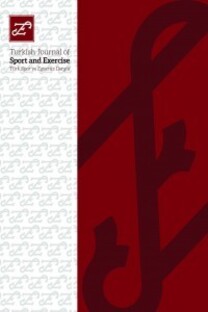Determination of Physical Activity Levels of Taekwondo Coaches
Abstract The aim of this study is to determine the physical activity levels of taekwondo trainers. The total of 544 (132 women, 412 men) trainers participated in the trainer development seminars organized by Turkey Taekwondo Federation participated as volunteers in this research.The physical activity levels of the participants were determined with the short form of the International Physical Activity Questionnaire (UFAA). SPSS 22.0 statistical package program was used to evaluate the data obtained within the scope of the research. The data were analyzed by Kolmogorov-Smirnov test for normality. The Mann- Whitney U test was used because the data were not distributed normally and the significance level was accepted as 0.05. According to the research findings, 3.2% of the trainers had low physical activity level, 61.4% had moderate and 35.5% had high physical activity level. There were statistically significant differences in mean age, height and body weight (p <0,05), no significant difference was found between male and female trainers in sitting, walking, moderate physical activity, high intensity physical activity and total physical activity scores (p> 0.05). It can be said that most of the taekwondo coaches have moderate physical activity levels.
Keywords:
Taekwondo, Coache, International Physical Activity Questionnaire,
___
- Archer E, Blair SN. Physical activity and the prevention of cardiovascular disease: from evolution to epidemiology. Prog Cardiovasc Dis. 2011 May-Jun;53(6):387-96.
- Bauman A, Ainsworth BE, Sallis JF, Hagströmer M, Craig CL, Bull FC, Pratt M, Venugopal K, Chau J, Sjöström M; IPS Group. The descriptive epidemiology of sitting. A 20-country comparison using the InternationalPhysical Activity Questionnaire (IPAQ). Am J Prev Med. 2011 Aug;41(2):228-35.
- De Rezende LF, Rodrigues Lopes M, Rey-López JP, Matsudo VK, Luiz Odo C. Sedentary behavior and health outcomes: an overview of systematic reviews. PLoS One. 2014 Aug 21;9(8):e105620.
- IPAQ. Guidelines for data processing and analysis of the International Physical Activity Questionnaire (IPAQ). Short and long forms, 2005. Available from file:///C:/Users/asus/Downloads/scoring_protocol%20(1).pdf
- Katzmarzyk PT, Church TS, Craig CL, Bouchard C. Sitting time and mortality from all causes, cardiovascular disease, and cancer. Med Sci Sports Exerc. 2009 May;41(5):998-1005.
- Öztürk M. Üniversitede Eğitim Öğretim Gören Öğrencilerde Uluslararası Fiziksel Aktivite Anketinin Gecerliliği ve Güvenirliği ve Fiziksel Aktivite Düzeylerinin Belirlenmesi, Yüksek Lisans Tezi, Hacettepe Universitesi, 2005, Ankara.
- Pengpid S, Peltzer K, Kassean HK, Tsala Tsala JP, Sychareun V, Müller-Riemenschneider F. Physical inactivity and associated factors among university students in 23 low-, middle- and high-income countries. Int J Public Health. 2015 Jul;60(5):539-49.
- Prince SA, Adamo KB, Hamel ME, Hardt J, Connor Gorber S, Tremblay M. A comparison of direct versus self-report measures for assessing physical activity in adults: a systematic review. Int J Behav Nutr Phys Act. 2008 Nov 6;5:56.
- Rod K. Dishman RK, Richard A. Washburn RA & Dale A. Schoeller DA. Measurement of Physical Activity. QUEST 2001; 53 (3): 295-309.
- Sigmundová D, Sigmund E, Hamřík Z, Kalman M, Pavelka J, Frömel K. Sedentary Behaviour and Physical Activity of Randomised Sample of Czech Adults Aged 20-64 Years: IPAQ and GPAQ Studies between 2002 and 2011. Cent Eur J Public Health. 2015 Nov;23 Suppl:S91-6.
- Shephard RJ. Limits to the measurement of habitual physical activity by questionnaires. Br J Sports Med 2003;37:197–206.
- WHO (World Health Organization 2019) https://www.who.int/news-room/fact-sheets/detail/physical-activity
- Başlangıç: 1999
- Yayıncı: Selçuk Üniversitesi, Spor Bilimleri Fakültesi
Sayıdaki Diğer Makaleler
Deniz ULUIŞIK, Ercan KESKİN, Durmuş HATİPOĞLU
Examination of the Resilience Levels of Women and Men Do Sport in Gyms
Ali Osman KIVRAK, Mehibe AKANDERE
Determination of Isokinetic Strength of Upper and Lower Body of Elite Male Boxers
Oktay ÇAKMAKÇI, Samet AKTAŞ, Ali TATLICI
Hani HAJ SALİMİ, Farhad RAHMİNİ-NİA
Özgür EKEN, Armağan KAFKAS, Yalçın AYDIN, Fahri Safa ÇINARLI, Muhammed Emin KAFKAS
Ömer KAYNAR, Fatih BİLİCİ, Korkut ULUCAN, Canan SERCAN
The Effect of Exercise Order on Maximum Strength Development in Resistance Trainings
